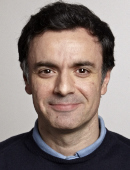
David Dominguez-Sola, MD, PhD
About Me
David Dominguez-Sola, MD, PhD, is Assistant Professor in the Departments of Oncological Sciences and Pathology at the Icahn School of Medicine at Mount Sinai (Icahn) and serves as faculty in Cancer Biology for the Graduate School of Biological Sciences, also at Icahn. He is a member of The Tisch Cancer Institute and the Precision Immunology Institute.
Originally trained as a hematopathologist, Dr. Dominguez-Sola’s scientific career has been focused on the study of pathogenesis of hematologic malignancies. Dr. Dominguez-Sola’s laboratory studies the molecular and cellular principles of cancer initiation and the underlying basis of precancerous states using B cell lymphomagenesis as reference model. They also conduct research on the mechanisms that support cancerous transformation in mature B cells, and how these relate to mechanisms supporting adaptive immune responses.
Dr. Dominguez-Sola has received numerous awards, including the Harold and Golden Lamport Research Award from the Icahn School of Medicine at Mount Sinai, Gabrielle’s Angel Foundation for Cancer Research Award, Leukemia Research Foundation New Investigator Award, Young Scientist Cancer Research Award from The Tisch Cancer Institute, and a K99/R00 Career Development Award from the National Institutes of Health (NIH)/National Cancer Institute (NCI). He is an ad-hoc reviewer for the NCI’s Small Grants Program for Cancer Research, and is also a reviewer for numerous journals, including Nature Communications, Journal of Experimental Medicine, Cell Reports, Journal of Cell Biology, Blood, Blood Advances, and Leukemia. His most recent grant funding from the National Cancer Institute supports the investigation of the role of FOXO1 mutations in the pathogenesis of B cell non-Hodgkin lymphomas.
Language
English
Position
ASSOCIATE PROFESSOR | Oncological Sciences, ASSOCIATE PROFESSOR | Pathology, Molecular and Cell Based Medicine, ASSOCIATE PROFESSOR | Graduate Education, ASSOCIATE PROFESSOR | Immunology & Immunotherapy
Research Topics
B Cells, Cancer, Cell Biology, DNA Replication, Gene Regulation, Immunology, Lymphocytes, Lymphoma, Molecular Biology, Transcription Factors, Transgenic Mice, Tumorigenesis
Multi-Disciplinary Training Areas
Cancer Biology [CAB], Immunology [IMM]
Education
MD, Autonomous University of Barcelona (UAB) Medical School
PhD, Pompeu Fabra University (UPF)
, Columbia University
Research
Invisible to the human eye, cancer initiation is believed to shape the molecular and cellular landscape of all cancers. Although we have been able to probe these pre-malignant stages in a handful of tumor types, our knowledge remains exceptionally limited for other malignancies like B-cell lymphomas.
B cell lymphomas occur both in adult and children, being one of the most common cancers in the latter group. Notably, an importantfraction of lymphomas rely on the activation of oncogenes through particular genetic rearrangements (e.g. translocations). These genetic events are known to drive lymphomagenesis in animal models, and constitute a useful system to study the basic mechanisms of cancer initiation and progression.
Most human B-cell lymphomas arise from B-lymphocytes (B cells) recruited to transient microanatomic structures known as Germinal Centers. Germinal centers are highly organized and dynamic compartments where B cells are trained and selected for their ability to efficiently recognize antigens, a process that is essential to sustain efficient immune responses. However, the molecular and cellular events driving the germinal center also impose a high risk for cellular transformation and lymphomagenesis.
Our laboratory is particularly interested in understanding the early steps of B cell lymphomagenesis, and in deciphering how the tissue and cellular contexts affect how oncogenes drive lymphoma initiation and shape the genetic landscape of lymphoma cells, with a particular interest in B-cell lymphomas driven by deregulation of the c-Myc protooncogene. To address these questions we use a multiplicity of in vitro and in vivo methodologies that combine strategies borrowed from both the cancer biology and immunology fields. Using this approach we are refining our knowledge on the cellular origin of B-cell lymphomas and the basic mechanisms of cancer initiation.
Visit the Dominguez-Sola Laboratory